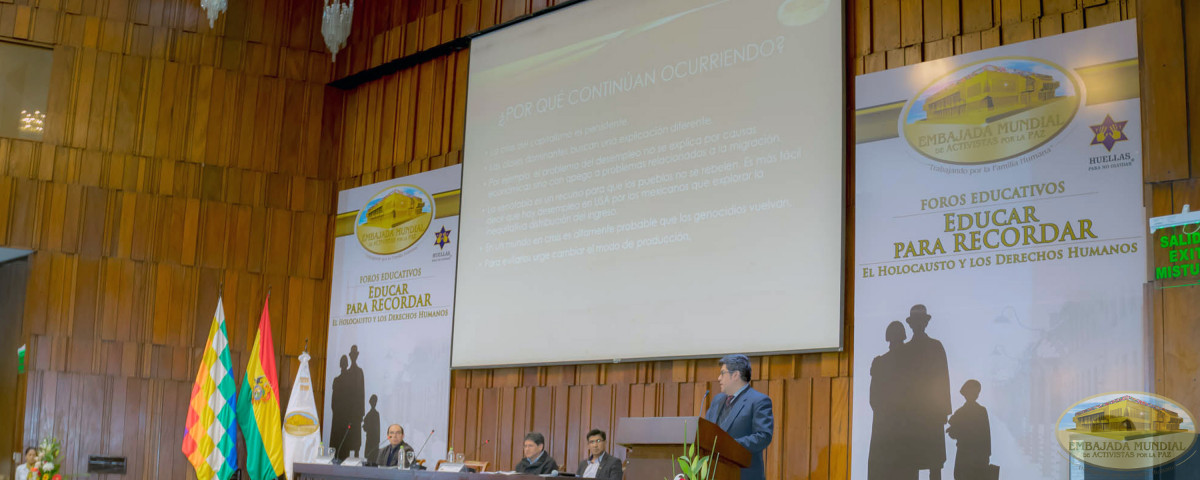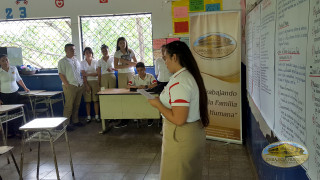Global Embassy of Activists for Peacehttps://www.embajadamundialdeactivistasporlapaz.com/sites/all/themes/emap_theme/logo.png
Global Embassy of Activists for Peace
The GEAP celebrates the International Day of Human Rights in Bolivia.
"Teaching the Holocaust as a mechanism to achieve peace"
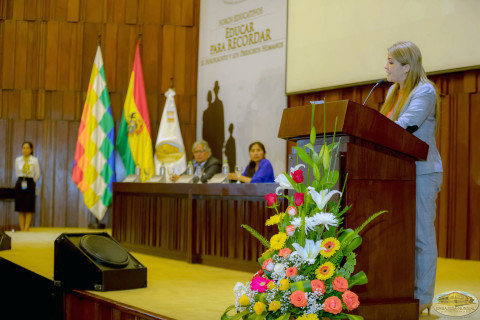 With the opening words of Gabriela Lara, general director of the GEAP and Lyneth Guzmán, Senator of the Plurinational State of Bolivia, the official celebration of the International Day of Human Rights was made. The "Educating to Remember" forum was held at the Central Bank of Bolivia under the theme: The Holocaust and Human Rights, was supported by the Chamber of Senators, the Committee of Plural Justice and the Council of the Magistracy, along with the Senate Committee.
With the opening words of Gabriela Lara, general director of the GEAP and Lyneth Guzmán, Senator of the Plurinational State of Bolivia, the official celebration of the International Day of Human Rights was made. The "Educating to Remember" forum was held at the Central Bank of Bolivia under the theme: The Holocaust and Human Rights, was supported by the Chamber of Senators, the Committee of Plural Justice and the Council of the Magistracy, along with the Senate Committee.
In her speech, the general director of the GEAP thanked all the support for the initiative to see human rights from the lessons of the Holocaust, a fact attributed to the emergence of the Universal Declaration of Human Rights of 1948, proceeding then to the reading of the message that Dr. William Soto sent to all attendees.
According to Soto, the Holocaust along with other genocides should be the historical reference with which the true meaning of human rights is taught. He also pointed out that the GEAP contemplates, in accordance with Resolution 60/7, the implementation of an education in values based on the teaching of this historical tragedy with the sole purpose of avoiding its repetition until reaching the desired goal of peace.
For Lyneth Gúzman the celebration of the International Day of Human Rights is a party: "If you are the one who promotes it, if you are not the one who practices it, but above all, if you are not the one who teaches with practice, really, the theory is just not enough". For the senator, the practice of human rights is a practice for life, for life and for a good life, as contemplated in the Political Constitution of her country.
Holocaust and Human Rights
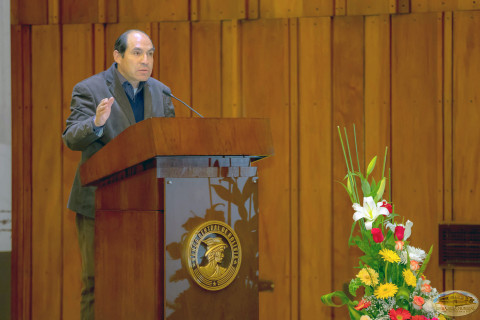
The head table was conformed by Mr. José Luis Aguirre, Ph.D. René de Jesús Zeballos, Jaime Durán Chuquimia, Deputy Minister of Budget and Fiscal Accounting of the Ministry of Economy and Public Finance of Bolivia, and Senator Ciro Zabala.
For José Aguirre, communication is a human right, so he also titled his paper under the approach that the word communication carries in itself a direct relationship with the word: community.
"Everyone communicates, that is why its quality must be recognized as a right", he also stressed, noting that communication is a gift inherited from history and that therefore everything communicates.
However, his presentation went a bit further, pointing out that the communication process as a right must be inclusive by the same diversity of actors that exist and, therefore, communication should be separated from all personal interest.
The second intervention was in charge of the State. Jaime Durán, making a historical tour of what the Holocaust was as the origin of the word genocide. He also indicated the reasons why he considers that there are still acts of genocide, among them, the fact that the dominant classes seek explanations different from the real ones, giving as an example that today the problem of unemployment is explained as a consequence of migration and not economic reasons.
Ph.D René Zeballos emphasized an education on human rights, which transcends the simple knowledge of knowing them, for him, the true meaning of teaching in the educational field on human rights must go as far as practicing them as a process of interiorization and exteriorization.
For this reason, his presentation was focused on the experience that he has had over these years when working on these issues with youths. For Dr. Zeballos, human rights are an ethical and moral issue and therefore are the foundation of democracy.
Human rights in Bolivia
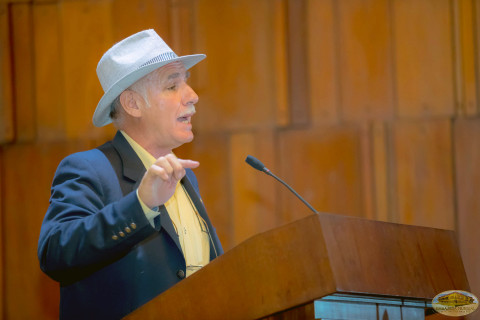
Senator Ciro Zabala was in charge of closing the lectures, his presentation: The process of change and human rights in the Plurinational State of Bolivia, was focused on pointing out that his country has great advances regarding the recognition of human rights.
He also noted that it is impossible to legislate on human rights issues if human rights are not within the legal system, for this reason, he concluded by saying that "for human rights to be fulfilled, each and every one of those who make up society must do something".
Recognition of the GEAP
In the same act, Senator Lineth Guzmán delivered to Gabriela Lara, a statement from the plenary session of the Chamber of Senators of the Plurinational Legislative Assembly of Bolivia, recognizing the Global Embassy of Activists for Peace "for working tirelessly for humanity, guaranteeing the common well-being of our societies and the integral development of the human being and of Mother Earth. Given in the Chamber of Sessions of the Chamber of Senators of the Plurinational Legislative Assembly of Bolivia."
